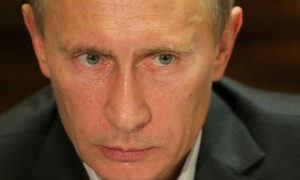by Dr. Miklos K. Radvanyi • Washington Times
 The failure of Soviet totalitarianism ultimately brought down the Soviet Union itself in 1991. In the years following its collapse, the new Russian Federation struggled with a different problem: the seemingly terminal atrophy of the state and its authority. The so-called neo-liberals who came to power with Boris Yeltsin tried, but failed to deliver on their political and economic promises.
The failure of Soviet totalitarianism ultimately brought down the Soviet Union itself in 1991. In the years following its collapse, the new Russian Federation struggled with a different problem: the seemingly terminal atrophy of the state and its authority. The so-called neo-liberals who came to power with Boris Yeltsin tried, but failed to deliver on their political and economic promises.
Instead of developing the free market economy they envisioned, Russia morphed into a sort of mafia state with a crony based economy run by a government that allowed its political allies to plunder state enterprises in the name of “privatization.” The new state delivered little to the average Russian, but enriched those with ties to the Kremlin.
Opponents of Yeltsin’s neo-liberals, led by Aleksandr Soygu, head of the Ministry of Emergency Management, argued that Russia needed an anti-Yeltsin to reestablish order in Russian society through the restoration of a powerful, perhaps all-powerful, state.
This anti-Yeltsin emerged on December 31, 1999, when President Yeltsin resigned and appointed his until then little known Prime Minister, Vladimir Vladimirovich Putin, as Acting President of the Russian Federation. The new president was duly reconfirmed in his position by 53 percent of the vote. From that moment on Vladimir Putin, whose initials correspond to the Russian acronym for Gross Domestic Product (GDP), began to reintroduce the people to the paternalistic care of an increasingly totalitarian “Mother Russia.”
Russians have always placed great store in symbols and myths, so the new regime identified itself whenever possible with the time-tested national symbol, the legendary Russian bear whose human embodiment has been presented as none other than Putin himself. As a mythical animal of the people as well as the autocratic past, the Russian bear is beloved by everybody; symbolizing unity, stability and peace within society.
Above all, the Russian bear is viewed by as proud and big-hearted, but shrewd, unpredictable and prone to violence when provoked. These are the very qualities that have combined to create Putin the Gambler who has proved to be intuitively decisive, but narrow-minded with little capacity to develop anything resembling a global vision and seemingly impervious of the long-term consequences of his willingness to sacrifice everything for immediate success.
This almost mythical Putin has become a hero to the overwhelming majority of the Russian people and his popularity skyrocketed in the wake of his seizing and annexing Crimea in March of 2014 and launching a secretive occupation of eastern Ukraine. In response to the Ukrainian military’s offensive against the surreptitiously invading Russian army, Putin ordered an all out attack in eastern Ukraine, resulting in the illegal occupation of the Donetsk and Luhansk regions.
The Ukrainian adventure has been presented inside Russia and to the world as a defensive reaction to save Russian civilization from the barbaric assault of the semi-Westernized Ukrainians, but in reality it was a gamble based on Putin’s belief that Ukraine would collapse and her Western defenders would flinch.
That hasn’t happened. The violence in Crimea and eastern Ukraine resulted in the so-called Minsk Protocol in September 2014 and a second protocol in February 2015 which rewarded Moscow for its breach of the original accord by tolerating Russian separatist control of the Donbass region through the end of 2015. In reality, the Minsk agreements have solved nothing, leaving forces in the region in a strange standoff, in which the conqueror has been sinking in the quicksand of chaos while the putative loser holds him prisoner because of the inconclusiveness of the situation.
Clearly, Putin has not conquered eastern Ukraine, he is only occupying these territories. Thus, in spite of his early seemingly successful gamble, he has merely created a vacuum that could end in total disaster for Russia and her neighbors by destroying the balance of the post-Soviet Union system of sovereign states which will threaten the stability of the European Union, and ultimately the viability of NATO.
The most important lesson for the United States and the West to draw from what’s happened in the region thus far is that a grand bargain with Putin’s Russia is impossible. With a historically weak economy, a hopelessly corrupt financial establishment, and an autocratic political system devoid of meaningful ideas and relying on appeals to raw nationalism for legitimacy, Russia will always respond to the logic of strength and force alone. Strength and the willingness to use that strength if need be, is the one thing that the gambler in the Kremlin understands.
It is up to the West and especially the United States to call the gambler’s bluff by demonstrating leadership and resolve to prevent further aggression and the possible outbreak of a general war in Europe and beyond.
. . . . . . . . . . . . . . . . . . .
Dr. Radvanyi is the Vice President of Frontiers of Freedom.